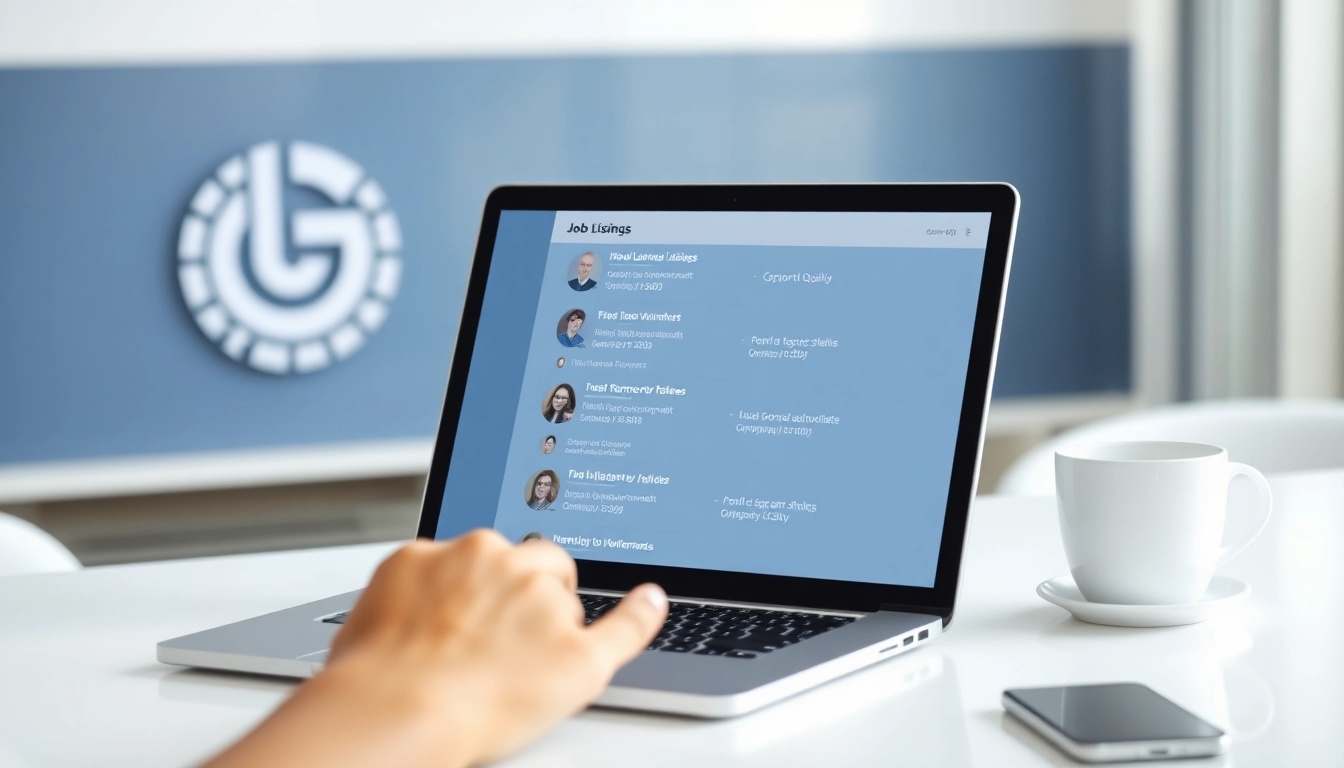Understanding the Landscape of Multinational Company Jobs
Securing a position within a multinational company (MNC) offers unparalleled opportunities for career growth, global exposure, and financial rewards. The landscape of multinational company jobs is robust and diverse, spanning various industries, geographies, and job functions. As global markets continue to intertwine, companies are increasingly seeking talented professionals who can navigate complex international environments. Understanding the key industries, current global employment trends, and essential skills necessary to succeed in this competitive arena is vital for job seekers aiming to land their dream roles in top multinationals.
Key Industries Offering Multinational Job Opportunities
Multinational corporations operate across a multitude of sectors, each presenting unique opportunities for aspiring professionals. The most prominent industries include:
- Technology and IT: Leading companies in software development, hardware manufacturing, cloud computing, and cybersecurity regularly seek talent globally. Notable firms include Google, Microsoft, SAP, and emerging AI companies, emphasizing roles like software engineers, data scientists, and technical support specialists.
- Finance and Banking: Banks, investment firms, and insurance companies such as HSBC, JP Morgan, and Allianz have extensive operations worldwide, offering roles in risk management, compliance, and financial analysis.
- Pharmaceuticals and Healthcare: Global pharmaceutical giants like Pfizer, Novartis, and Roche provide opportunities in research, regulatory affairs, and manufacturing, often requiring specialized skill sets.
- Consumer Goods and Retail: Companies like Unilever, Procter & Gamble, and IKEA operate extensive supply chains and sales networks, needing professionals in supply chain management, marketing, and logistics.
- Automotive and Manufacturing: Multinational automakers such as Toyota, BMW, and Ford seek engineers, project managers, and quality control specialists for their international plants.
- Energy and Utilities: ExxonMobil, Shell, and renewable energy firms operate across continents, providing roles in engineering, environmental safety, and corporate strategy.
These industries underscore the diversity and breadth of opportunities available in the global job market, emphasizing the importance of specialized skills aligned with industry demands.
Current Trends in Global Employment Markets
The international employment landscape is rapidly evolving, influenced by technological innovation, geopolitical shifts, and economic cycles. Key trends include:
- Remote Work and Flexibility: The COVID-19 pandemic accelerated remote work adoption, making it a permanent feature in many MNCs. This shift broadens access to multinational roles beyond local borders, emphasizing the importance of digital communication skills and self-management.
- Digital Transformation: Companies are investing heavily in digital infrastructure, cloud services, and automation. Demand for IT professionals adept at managing digital ecosystems continues to surge.
- Sustainability and Corporate Responsibility: Environmental, Social, and Governance (ESG) criteria influence hiring strategies, fostering roles in sustainability reporting, green technology, and corporate ethics.
- Diversity and Inclusion: Multinational firms prioritize building inclusive workplaces, actively recruiting diverse talent pools worldwide.
- Skills in Demand: Data analysis, artificial intelligence, cybersecurity, multilingual communication, and cross-cultural competency are increasingly essential for multinational roles.
Keeping abreast of these trends enables job seekers to tailor their skills and applications effectively, increasing their competitiveness in the global job market.
Essential Skills for Landing Multinational Positions
To excel in securing roles within multinationals, professionals need a combination of technical expertise and soft skills. The following key competencies are critical:
- Technical Proficiency: Depending on the industry, this could include programming languages, data analytics, financial modeling, or regulatory knowledge. Certifications in relevant areas can boost credibility.
- Cross-Cultural Communication: Multinational companies value candidates who can effectively communicate across diverse cultures and languages, facilitating international teamwork and negotiations.
- Language Skills: Fluency in multiple languages enhances employability. English remains dominant, but proficiency in languages such as Mandarin, Spanish, German, or French is highly advantageous.
- Adaptability and Flexibility: The ability to adapt to different work cultures, time zones, and changing market conditions is crucial.
- Digital Literacy: Familiarity with collaboration tools, project management software, and digital marketing platforms can differentiate candidates.
- Problem-Solving and Critical Thinking: Multinationals seek innovative thinkers who can navigate complex issues and provide strategic solutions.
Cultivating these skills through continuous learning, certifications, and real-world experience is essential to gaining a competitive edge.
Crafting an Impactful Application for Multinational Companies
Optimizing Your Resume and Cover Letter for International Employers
Your application materials are your first impression. For multinational companies, it’s critical to tailor your resume and cover letter to emphasize global competencies, language skills, and cultural adaptability. Use clear, concise language, quantify achievements, and showcase your international experience if applicable.
Highlight your proficiency with global tools, compliance standards, or cross-border projects. Incorporate keywords relevant to the job description, which helps pass applicant tracking systems (ATS). Remember, your cover letter should narrate your international experience and motivation for working with a global firm.
Leveraging LinkedIn and Professional Networks Effectively
LinkedIn remains the premier platform to connect with recruiters and industry professionals worldwide. Optimize your profile by including a compelling summary, detailed experience, endorsements, and relevant skills. Join industry-specific groups, participate in discussions, and follow target companies to stay informed about openings.
Building relationships with alumni, colleagues, and multinational professionals can lead to referrals and insider insights. Remember, a well-maintained digital presence signals professionalism and global readiness.
Preparing for Multinational Company Interviews
International interviews often include behavioral, technical, and situational assessments. Research the company’s global operations, cultural values, and recent news. Prepare STAR (Situation, Task, Action, Result) responses tailored to multicultural contexts.
Practice language proficiency if required, and demonstrate adaptability, cultural sensitivity, and a global mindset. Be ready to discuss how your skills align with the company’s international goals and challenges.
Strategies for Standing Out in a Competitive Global Job Market
Building a Personal Brand Recognized by Multinational Recruiters
Establishing a strong personal brand involves showcasing your expertise, global mindset, and cultural adaptability. Share thought leadership articles, participate in webinars, and publish content relevant to your industry and international work trends.
Consistency across your online presence emphasizes your professional identity—use a professional photo, coherent messaging, and an active engagement schedule.
Utilizing Niche Job Portals and Company Career Pages
Beyond general job boards, explore niche portals dedicated to global careers, expatriate opportunities, and industry-specific roles. Many multinationals list vacancies directly on their careers pages, often offering tailored application pathways.
Regularly monitor these platforms, set alerts, and tailor your application for each role. Building familiarity with target companies increases your chances as positions open.
Networking with Key Decision-Makers in Top Multinational Firms
Direct connections can significantly expedite the hiring process. Attend international conferences, join professional associations, and participate in industry events—virtually or physically.
Engage with decision-makers on LinkedIn or industry forums thoughtfully, demonstrating genuine interest, and offering value through insights or collaboration proposals. Building trust and rapport can lead to referrals and exclusive opportunities.
Getting Hired: Tips for Success in Multinational Company Roles
Understanding Visa and Relocation Processes
Securing a role in a multinational often involves navigating complex visa and relocation procedures. Familiarize yourself with the legal requirements, work permit options, and employer sponsorship policies in your target country.
Collaborate with your prospective employer’s HR or relocation team, provide necessary documentation promptly, and demonstrate cultural sensitivity during interviews to showcase adaptability.
Keep abreast of changes in immigration policies, as these can influence your employment timeline and options.
Adapting to Cultural and Operational Differences
Success in an international role hinges on cultural competence. Learn about local customs, communication styles, and workplace etiquette. Demonstrating respect and understanding fosters trust and collaboration.
Be proactive in seeking feedback, and show willingness to learn and adapt continually.
Onboarding and Performance Expectations in Global Organizations
Effective onboarding in a multinational setting involves understanding company policies, local practices, and global objectives. Clarify expectations early, seek mentorship, and utilize training resources.
Regularly review your performance metrics, seek feedback, and adjust strategies to align with organizational goals.
Tracking and Improving Your Application Performance
Using Metrics to Assess Your Job Search Effectiveness
Monitor key indicators such as the number of applications submitted, responses received, interview invitations, and offers. Use tools like spreadsheets or application trackers to identify patterns.
Analyze what strategies yield the best results, whether it’s targeting specific industries, enhancing certain skills, or refining application documents.
Adjusting Strategies Based on Feedback and Market Changes
Incorporate feedback from interviews and rejections to refine your approach. Stay informed about market trends, emerging roles, and industry demands, adjusting your skill development and application focus accordingly.
Flexibility and responsiveness are vital—embrace continuous improvement to stay relevant.
Continuous Skill Development to Maintain Competitive Edge
Engage in ongoing education—online courses, certifications, language learning, and industry seminars. Staying updated on new technologies and regulations ensures your profile remains attractive to multinational recruiters.
Consider acquiring global certifications such as PMP, CFA, or industry-specific credentials that enhance your credibility and marketability.



